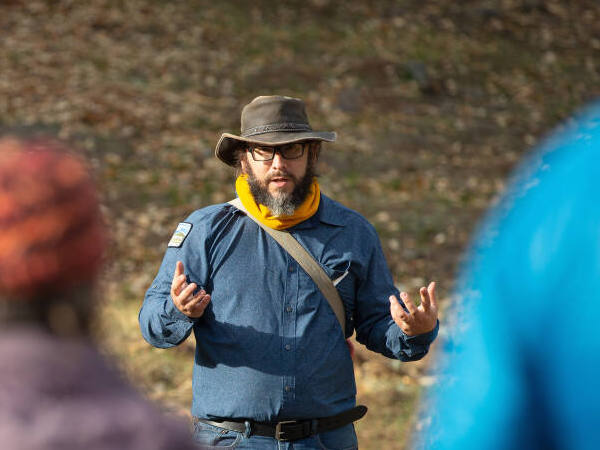For many years before settling with his family in Sonoma Valley, Dan Levitis was an “itinerant scientist” as he puts it, traveling the world, doing field work, taking academic posts, and gaining experience as a scientist and teacher.
Born in Washington, D.C. and raised in Maryland, with a Ph.D. in integrative biology from UC Berkeley, Dr. Dan (as we like to call him) has banded birds in Papua New Guinea, studied their behavior at the Bronx Zoo, chased condors in California, and researched, studied or taught in Germany, Denmark, Australia, Ontario, Vermont, Maine, Florida and Wisconsin, among other places. Somewhere along the way he got married, started a family and moved to Boyes Hot Springs. Today he’s a Flowery Elementary School dad.
As a generalist in the field of biology, and with such a well-traveled past, Dan has a diverse sense of what and how to teach. Whether he’s guiding a fire recovery walk at Sugarloaf, or creating and leading an academic course resulting in publication, or organizing the next iNaturalist nature challenge, his many-angled approach helps him reach a broader and more diverse community.
“People in academia end up teaching what they know best, and they assume all their students are drilling down to that level too, which isn’t the case,” he said. As a teacher, “It’s easier for me to see what things are different, what things we need to slow down and take more time on, what things are relatively intuitive for the non-expert, and so on.”
As Sonoma Ecology Center’s community science coordinator, Dr. Dan is bringing science to Sonoma Valley residents in a number of creative ways. “Everyone is invited to join in our activities,” he says. “We strive to be inclusive and diversify our volunteer base with Spanish speakers, African Americans, Native Americans, LGBTQ people, younger people, differently abled communities, and so on.”
Los hispanohablantes pueden comunicarse con Alma Shaw al alma@sonomaecologycenter.org.
Below are just a few of the community science programs Dr. Dan is currently offering at Sugarloaf Ridge State Park. Those interested may email Dr. Dan for details at danl@sonomaecologycenter.org.
- iNaturalist Challenge: This weekly challenge uses iNaturalist, a free phone app for naturalists and nature-lovers, to hone the observational skills of Sugarloaf park visitors. Each week, participants are asked to photograph certain aspects of nature—wildflowers, for example, or animal tracks—and upload their photos to iNaturalist. One person each week wins a prize. To see the beautiful images resulting from these challenges, or to take on the next challenge, visit the Sugarloaf Facebook page.
- Critter Cam Volunteers: Dan is working with teenage volunteers to add critter cams and audio recorders around the park with the goal of monitoring fire recovery and regrowth. For example, “There’s a meadow that is just full of tens of thousands of whispering bell plants right now,” and with the help of the volunteer crew he intends to create amazing time-lapse movies of fire recovery.
- Fire Recovery Photo Posts: In the same vein, Dr. Dan has set up a few posts around Sugarloaf where anyone can set a phone or camera and take pictures of burned landscape. By returning to that exact spot and taking multiple photos over time, park visitors will have a ready-made time-lapse available, allowing them to see fire recovery in action over days, weeks and months.
- NEST: New Ecological Scientist Training, or NEST, is a unique course meant to give local students, particularly disadvantaged ones, a leg up in the sciences by helping them design, carry out and publish a research project. Dr. Dan says his intention is to explain the “how” of getting published in a scientific journal—something “I wish I had been taught that was never included in any of my classes.” His first class is currently underway at Sugarloaf. Click here for more.

